This post was actually started in May. I did so at the time because I wanted the emotions and recollection to be rather fresh. I finished (and now read this) with a heavy heart, because despite efforts for conversation and hoping for change, there has been largely none. This is the story about a Code of Conduct, and what can go wrong. It started with this post:
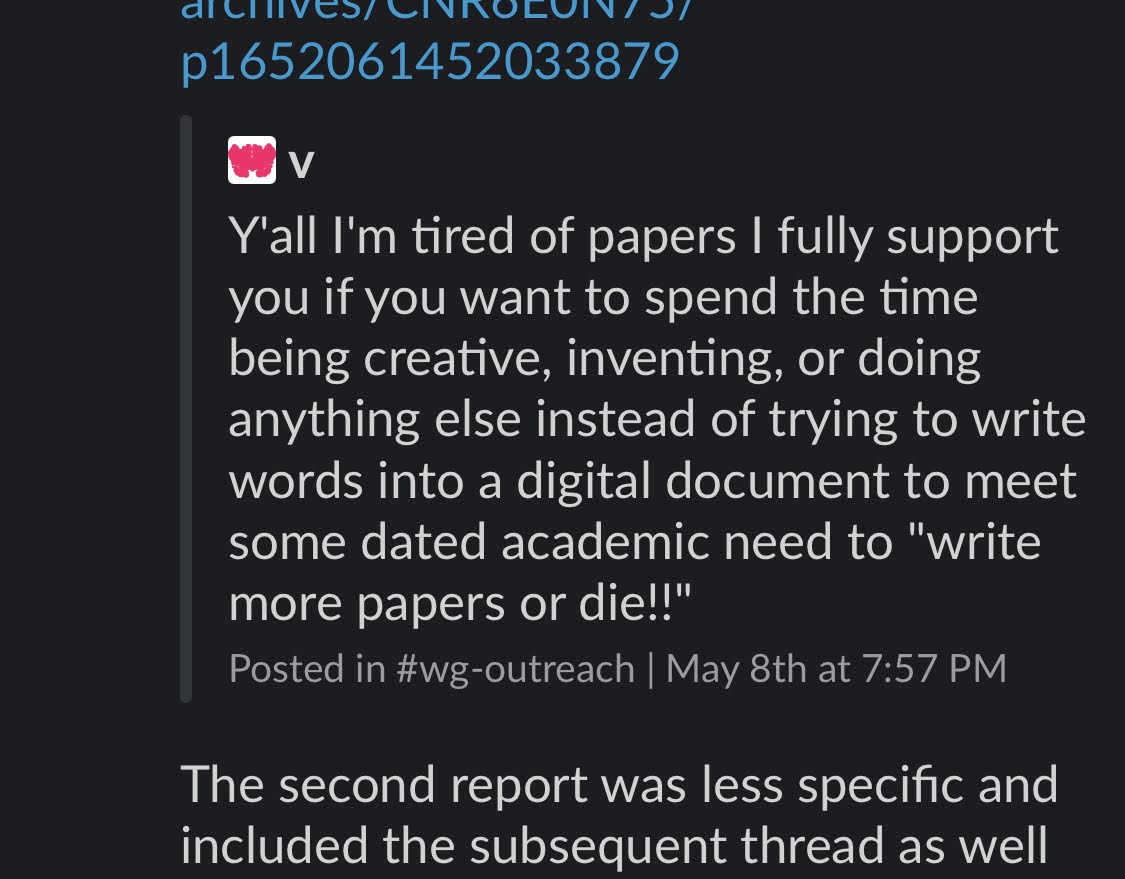
What is that post? It was me trying to inspire people for change. I had been exploring other ideas for software (and thus people) valuation, and wanted this topic to be at the forefront of the community thinking. I had woken up at 7 something on a workday, and passed by my computer planning to fall asleep for a bit longer. There was some reference to papers and I thought, “Ah! An opportunity to get people thinking differently!” In my half-asleep state I wrote the above, hoping to inspire people to think about metrics of value that extended beyond publication. It’s something that I still whole-heartedly believed should be the responsibility of our community to address - how we should not derive our primary value from publication and fall without any second thought into a traditional path of publication.
This statement is strong, maybe was trying to be a bit funny (the double exclamation point was intended to be funny to make the statement more dramatic), and it actually resulted in a good thread of conversation. I posted it, enjoyed the discussion, and largely forgot about it. I later learned that many that participated in the discussion were also appreciative of the conversation. Why did I say “die?” I did because I don’t like using traditional, known phrases that are cliches. In this conversation, that meant I switched “publish or perish” to words that have the same meaning, “write papers and die.” The strong term in there being “die,” which I’ve seen times before. I’m also aware that making global statements that imply a shared sentiment that may not be true is not kosher. This is why I make an effort to use I statements because (as far as I was aware before this incident) speaking in terms of my own feelings and desires is an OK thing to do, and does not enroach upon others.
But here’s the problem. Two people apparently had issue with my strong language. I don’t know the details, and can only guess what happened. Likely it started by one of them having their feathers ruffled, and they pinged their friend. They likely had a conversation together, and decided they could take action and both report me for violating the Code of Conduct. What resulted in the next few months in response to this incident was learning that the community was not ready for actually handling a report. If you know me well, you’d have noticed that my typical excited and happy self disappeared from the slack. This was a devastating event for me that took months to feel OK to even reflect about here, and even after that I feel that I suffered a huge loss. I have been an active and influential community member, and essentially the report has made the community an unsafe place for me to express my ideas and thoughts, and I’ve been being silenced. I want to talk about three things today:
- What happened (or didn't happen) from my perspective
- How everything made me feel
- Moving forward
To be clear, this is not the entire research software engineering community, but the arm of it I am associated with. For the last point, moving forward will likely not mean me participating as I once was, because I don’t see a way forward, nor do I see other people trying to push for one. I don’t feel safe to be my genuine self or practice free-speech in this community space, and it’s ironic because before (I had thought) it was so welcoming and forward thinking. But trying to be yourself, however intense you might be, in a place where you are walking on eggshells because anything you say is fair game for being reported is not a community I can thrive in. So for the last point, it’s really just about my hopes for change, and for what needs to be done from preventing this from happening again.
What happened, from my perspective
Transparency
For full transparency, which I think is important for all things, here is the full thread (with sub-threads expanded). I think this is OK to post here as it’s in a public slack channel.
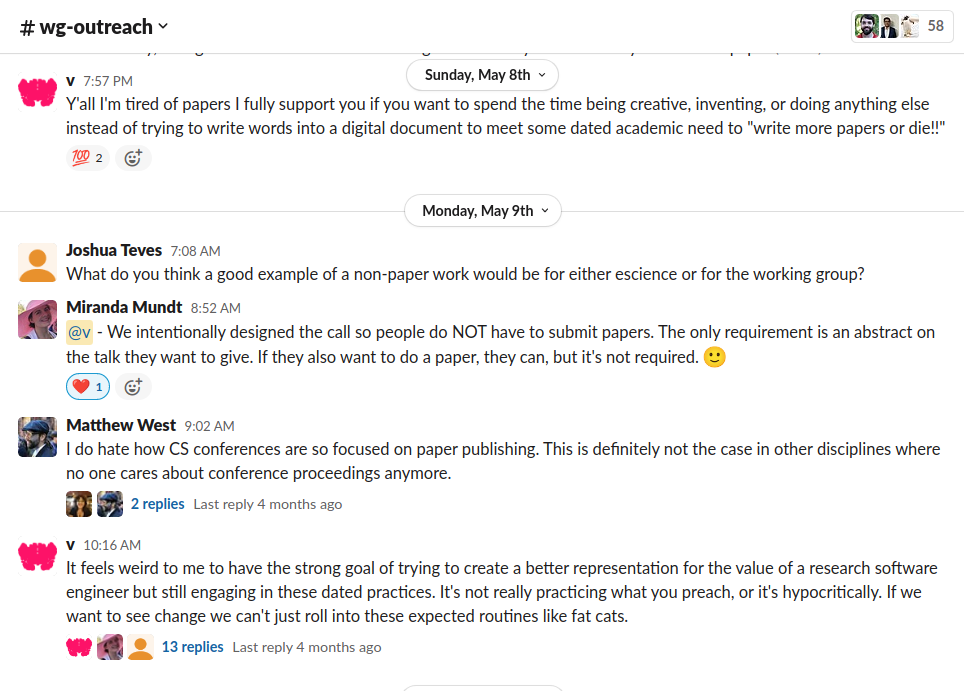
I even got two 💯️ reactions, which is an indication of strong agreement I think? I chose that channel because it felt more impersonal - people copy pasted calls for papers there, and it made sense to have discussion there (at least I thought at the time). The fat cats comment is a little weird, but when I expanded it I remembered where my head was at. I was commenting on our responsibility to be the change that we seek. And if we didn’t start getting creative and trying to think outside the box, we’d be rolling down hills. It was my own mental imagery. I look at a lot of cats on reddit, mostly of doing funny things, and for one reason or another had mental imagery of them rolling down a hill (and not realizing they are rolling down the hill). It was another attempt at humor, or trying to get people to see what was inside my head. Here you can see that I expanded the thought, probably realizing nobody else would get it:
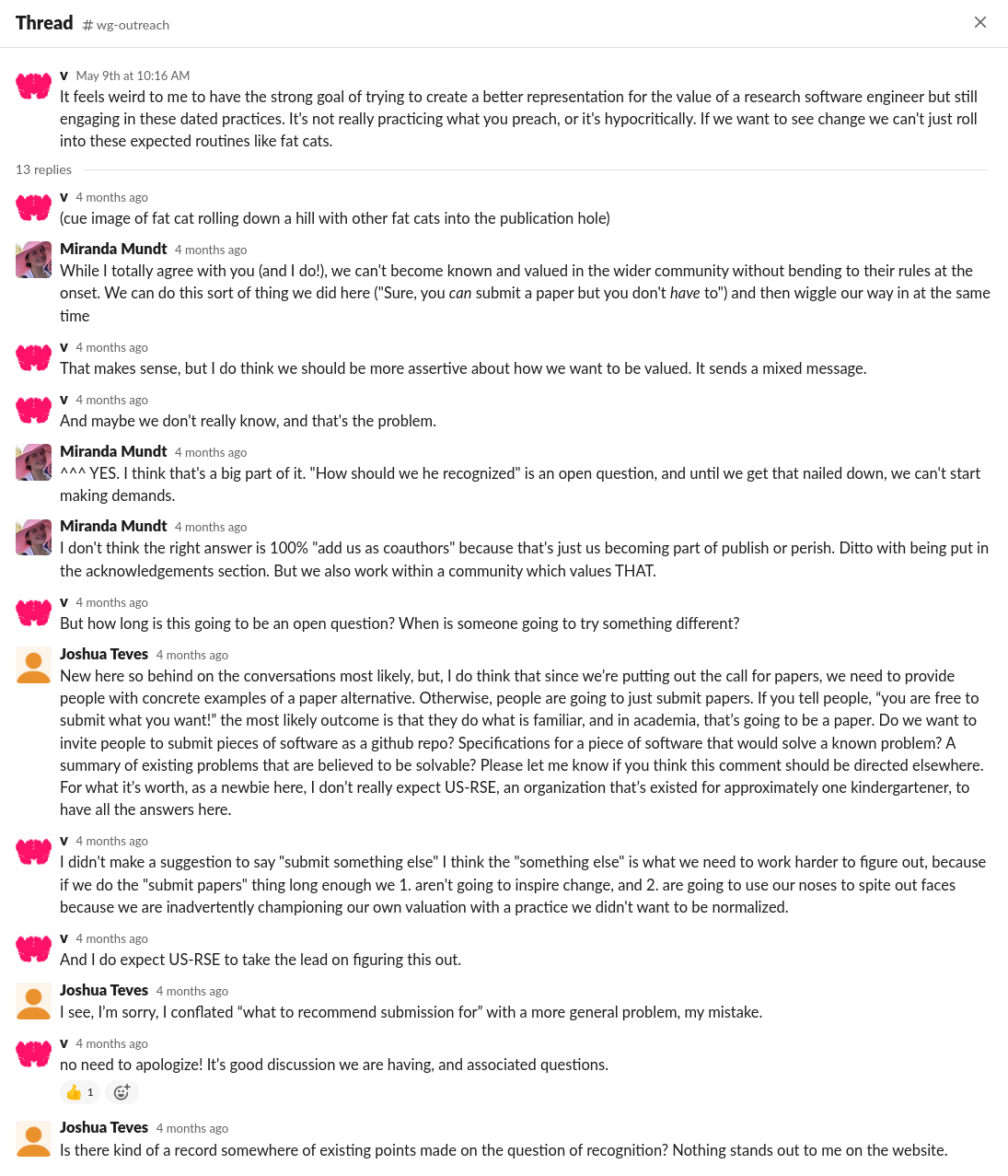
You can also see my frustration coming through that I didn’t think people were trying hard enough to inspire change. And it’s change that I wanted badly. Would I/we continue to write papers? Of course. But I wanted more, not just for myself, but for future folks that worked in the space. If it’s only a matter or limitation of our own creativity, why are we not getting creative and trying new things? I thought (maybe) it just needed to be brought to people’s attention. And this was another thread that I didn’t participate it, although I wanted to include for complete transparency.
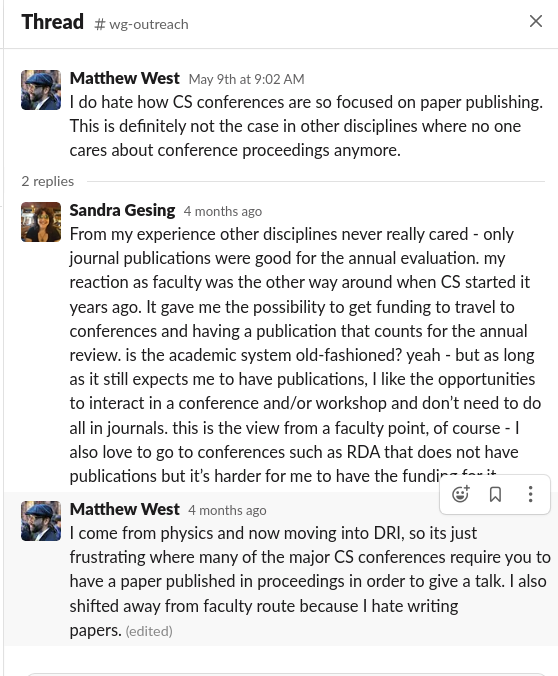
So that is the content, and all of it, and in reading it again I think my biggest fault is just my style of communication. It’s very blunt. When I was younger I used to be entirely silent (avoidance was a good strategy for people not having reason to not like me) and when I got older (college years) trying to constantly self-monitor and adopt myself to be whatever “this other person” wanted me to be was suffocating. Constantly trying to please others wears away at you, and I have finally allowed myself to be free from that because I’ve realized it’s impossible to make everyone happy, and we have to be true to ourselves (within reasonable limits of trying to do the right thing, speak on behalf of yourself, and generally trying to be a good person). However, we are not responsible for mangaging the emotions and reactions of others. For an extreme example, imagine that you are walking down the street and someone stops you, and alerts you they are offended by the color purple you are wearing because they like green better. To be frank, that’s their problem. You could either run home and change your attire, apologize and promise next time you’ll choose green, or just smile and walk away. But here’s the problem with the first strategy of appeasement - someone else is going to prefer purple. You can’t ever win. So you decide to wear purple, because that’s what is being true to yourself. Maybe you have a discussion to talk about why colors are upsetting, and you both learn or grow from it. That would be the strategy I’d take, and I’m on the more blunt end of that spectrum. The larger point is that people have different values and tastes, and it is infeasible to predict every possible interpretation of every tiny detail that we say. If we had to do that, we couldn’t say anything. For this scope or type of conversation, we are not responsible for altering our behavior or personality to make others more comfortable. It is entirely suffocating.
In the conversation above I state directly what I think we (“the community”) should be doing, and how I think by not doing that, and supposedly existing to give better recognition for people that work on software in research, is hypocritical. The discussion was short and landed in a spot where (I think) we realized that we didn’t know what “the other” entity of value is (or should be). Ironically I had a plan to engage with people further on this, and this conversation was just an entrypoint. I didn’t pursue this, obviously, after I was reported.
The Events that Followed
It’s was very messy how those in leadership dealt with this. I wasn’t explicitly present at their meetings so I can’t comment, but I can comment from the perspective of the person accused. After this event (that I had forgotten about) I was contacted unexpectedly by someone in leadership, and my good friend actually. The message explained that I was reported (without being allowed to provide detail aside from the thread I posted above), and I stumbled around my words trying to understand the reason. It was thought that my language was unfairly targeting a marginalized group or not fostering a welcoming community. The first point about marginalization didn’t make sense to me, because I used “I” statements and we all write papers. Was it a cat that filed the report? That might have been valid. 😸️ If it were true that my aim was to attack people that write papers I would also be targeting a group I am a part of, which isn’t logical. No, more logically I was making a call for change for a traditionally academic valuation system that I thought could be improved upon, and making an indirect comment on a system is not making commentary on people that have no choice but to use it. I have a hard time connecting these ideas to marginalization. I’ll get back to this idea of marginalization later, because I believe it was used incorrectly here. The second point also didn’t make sense, because my statement was not threatening anyone, and I didn’t understand why nobody was asking me about it. It felt very ironic, especially because I remember at some point in one of our community documents or meetings about assuming best intentions. That couldn’t have been done here if someone’s interpretation of my comment was treated as truth and immediately flagged it as malicious, no questions asked.
This interaction and ambiguity was the first red flag. There was a very poorly defined explanation of why my statement violated the Code of Conduct. As I talked to others about it, the reactions were mostly disbelief when I showed them the offending thread. Like, what?
So at this point in time, I didn’t know if it was a valid report. An overall sentiment questioned it. And dear reader, coming from the perspective of someone that has been yelled at in a chat (all caps), yelled at in a private office by a superior, or had inappropriate sexual or racial comments made to them, “Someone else said something that I didn’t like” is not a valid reason. We are cherry picking personal expression for political correctness. It’s making the space not appropriate to have discussion and disagreements. Disagreements (even about values) in a space with a lot of different people are expected. When someone disagrees with you, (or in my case) makes a statement that you perceive as disagreeing with a value that you hold, that leads to good conversation, and silently reporting them (at least to me) makes no sense unless you are the one with malicious intent. The second red flag was the fact that there was no clear next steps laid out for the process, and I could form no expectation.
I didn’t sleep that night, and the next day I decided I needed to speak up about what happened because mysteriously disappearing from the Slack as I spiraled into sadness and shut down would not make any sense without context. Here is what I said, for transparency:
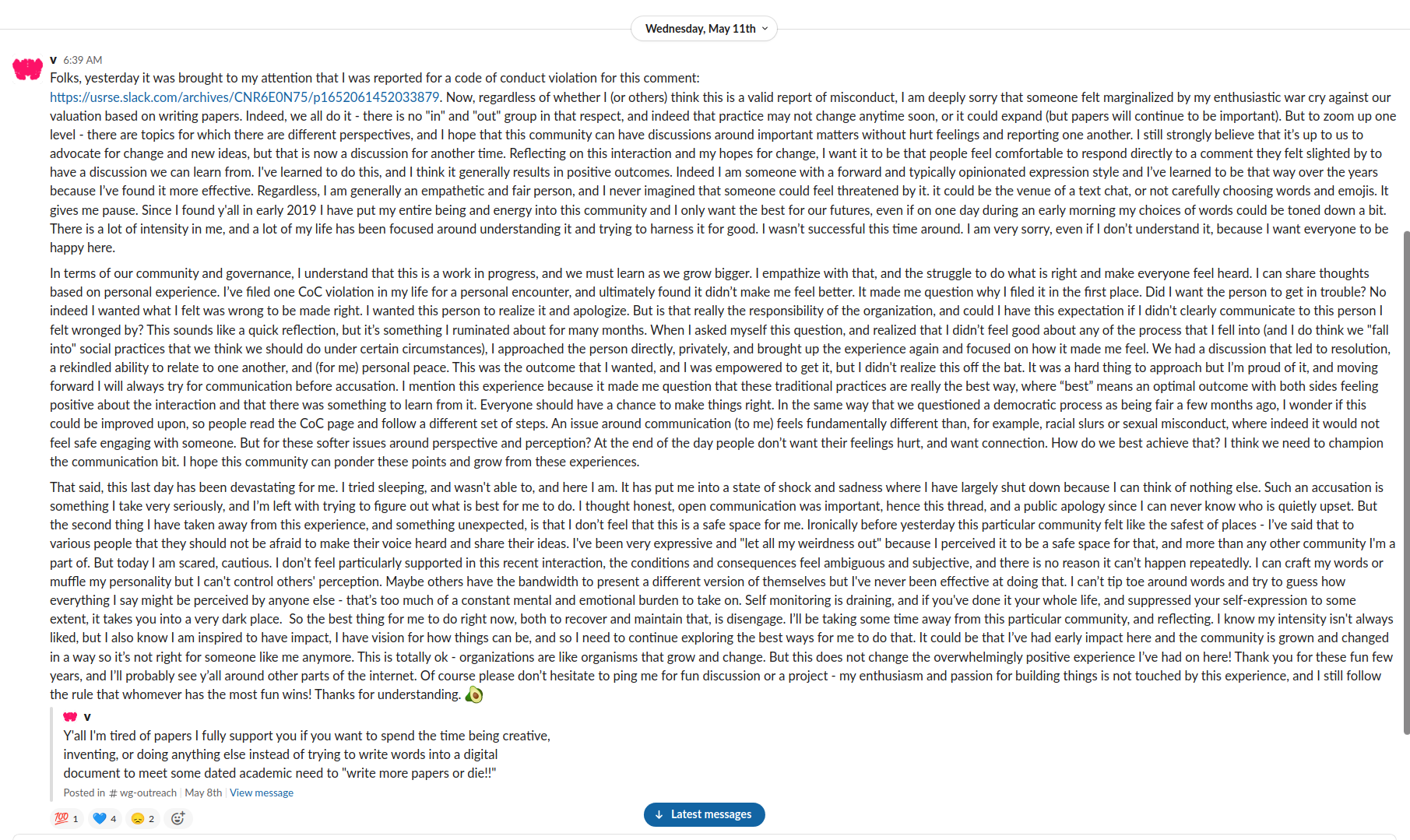
You’ll notice I immediately apologized. I immediately had my head go to what we could learn and how we could grow from this. That post also most accurately reflects my emotional state at the time, it was an awful experience for me. That was my last post in a public slack channel in this community.
Being able to step away gave me some relief from what I was feeling, because I had time to think, and people poured into private chat to support me. To those out there that did that, you know who you are, and I cherish you - it gave me some grounding that I wasn’t a terrible person, and perhaps these reporters that wanted to target me were in the minority. I also very much noted the people that didn’t offer me their support, and that spoke volumes. Again for transparency, I’ll show some public follow-up discussion from people who participated in (or later read) the thread. At this point I had largely left the slack, but someone pointed me to the thread to look at and get some closure.
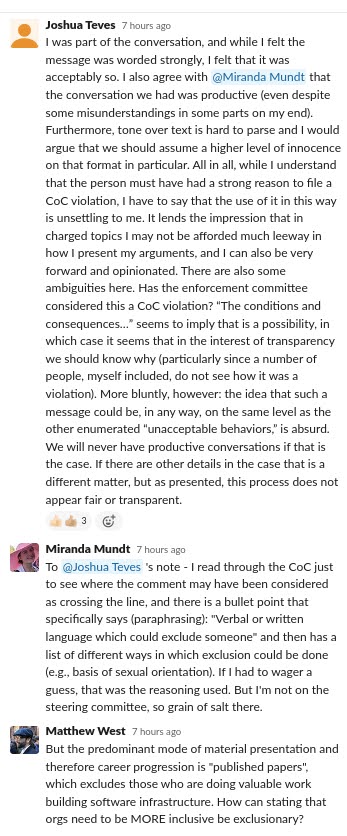
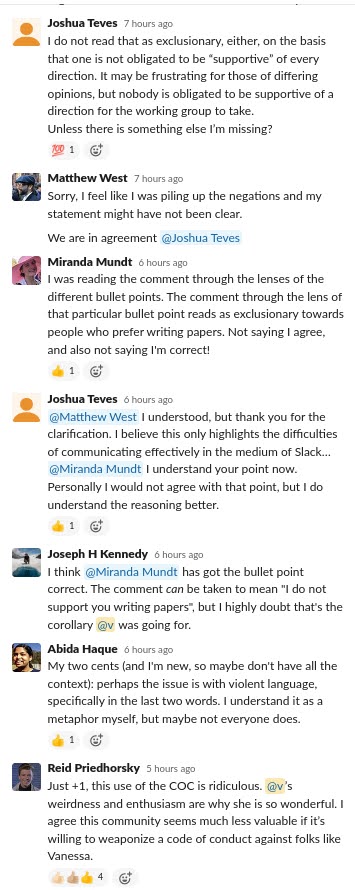
There are good points brought up here - that communication in chat is hard (and it’s hard to gague someone’s emotional state or intention)
and the important point about assuming the best. I also see people trying to guess why it was a violation, and I see people very much reflecting that they valued the conversation. Apologies for the pictures being out of order.
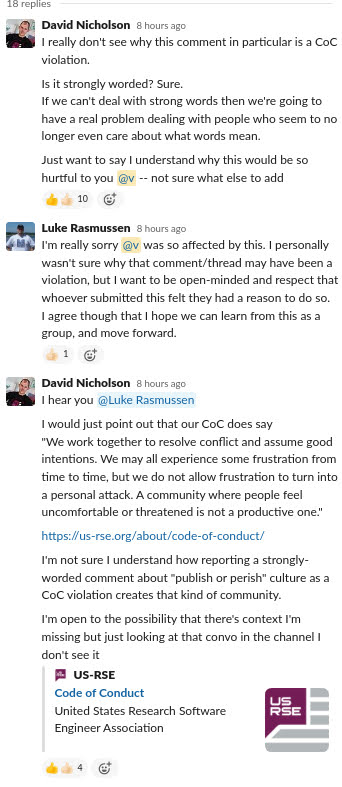
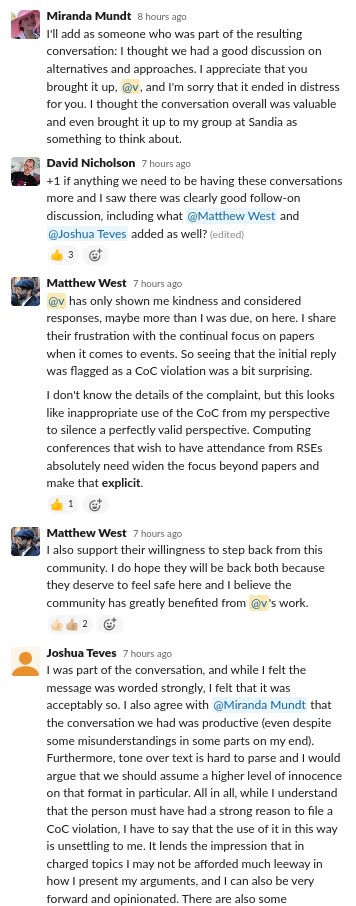
I shut down for about a week, because I felt numb. I was just really sad, and I didn’t understand what was going to happen. I was able to start thinking clearly somewhat after that. It was only then that my headspace switched from “I was wrong and am a terrible person” to “Wait, but did what I say really constitute a violation?” It’s amazing how a group in power, telling you something, can turn off your rational mind and just send you into self-deprecation and numbness mode.
I can’t tell you if anything productive happened in the next few weeks. I’ve been told the incident caused a wave of discomfort because others weren’t in belief either, or maybe the slack was just eerily quiet because I was gone. I think at some point there was a community meeting? But all in this time, leadership chose to take no stance to guide the community’s moral compass. The public messages from those in power were more like (this is my interpretation) “It’s all secret and the person that does the reporting is explicitly the victim and we support any future people that also file reports.” And then after this first community meeting I was hoping, practically praying that someone would still make things right and reach out to me with closure. It was depressing when that didn’t happen. There was not only no message to me, but an email was sent out to the community that basically said that people are forbid from discussing this previous event at the next community meeting. They wanted to stifle anyone trying to speak out on my behalf before it happened. Was it because they didn’t know how to handle it? Maybe. Whatever the incentives, the decision was clearly “Let’s just make a community meeting and hope other part goes away.” It was so disappointing and confusing. At this point I reached out again to the person that originally contacted me in Slack. He was my friend. And I said in so many words, “When is someone going to take care of me?” The message at the moment from the communication sent out was that they were going to brush it under the rug, and my presence in the community wasn’t deemed valuable enough (at least by those in power) to try and make things right.
It wasn’t until weeks later and some pushing of leadership that I was able to meet with them and express my side of what happened, and try to better understand why it was wrong in their eyes. At the time I was so grateful for the meeting and hoping to move forward from the event. I truly believed if we made an effort to inspire change, there would be more moral teeth applied to incidents like this (I’ll explain what I mean about this later), better communication, and the Slack could continue to be a safe place for expression and speech. In retrospect, I realized that the meeting was just to placate me. There again was a clear preference for not taking sides, or expressing any clarity or strong leadership about decisions around what happened. This meeting also needed to have been one of the first things that happened, because inherit in the timeline is the immediate branding of the reporters as “those to be protected and in the right” and in the “reportees” as “those that are bad and in the wrong.” But I’ll get back to what I think this process should look like later. This meeting was more like a support group, with people regularly saying they heard me, and then making some ambiguous statement. That said, each person there was someone that I respected and valued, and maybe it wasn’t perfect, but I’m grateful they tried. I want to point out that up to this point I still had no clear decision from leadership (beyond speculation) about if what I said was actually wrong, and I was still waiting with anticipation for just about anything.
It was then again another bout of time (e.g., early July) that I received drafts for the Code of Conduct transparency log, which I believe someone else in the community asked for. This was at the point where my hope turned into disappointment. The incident was reported plainly, and it made the many-month incident sound like it was succinct and properly dealt with:
The $EMAIL address received two reports of potential code of conduct violations from two $COMMUNITY members. The reports were in regard to a post and subsequent comments made in a public $COMMUNITY Slack channel that were perceived to have a hostile and antagonistic tone in a context that devalued the efforts of other members of the $COMMUNITY community. The CoC review concluded that the language was negatively impactful and inconsistent with the CoC goals of maintaining a “welcoming, friendly community for all”, regardless of intent. A subgroup of the Steering Committee examined the CoC complaint. The group decided that privately communicating the nature of the complaint to the reported person was the appropriate action. It was decided that no further action was necessary.
It was also expanded upon in the full log:
On May 9, 2022, the steering committee received two reports of potential code of conduct violations from two separate $COMMUNITY members. The first report referenced a post made in a public channel of the $COMMUNITY Slack workspace. The second report referenced the same post plus multiple follow up comments made by the author of the reported post in a subsequent thread in the same channel. In both cases, an email was sent to $EMAIL outlining the nature of the complaint. These reports were received by the members of the steering committee. In response, the steering committee organized a meeting at 3 PM ET that same day and formed a Code of Conduct review sub-group to discuss the two reports and to consider any appropriate course of action and follow up.
The review sub-group decided to consider both reports together since: (a) both reports were in response to posts made by the same member of the community; (b) the two separate reporters were aware of each other’s report; and (c) the conduct of concern in both reports centered on the same section of the Code of Conduct document.
The Code of Conduct review sub-group examined the posts; the relevant sections of the Code of Conduct included the guidelines against “trolling or insulting“ comments, comments that “had the effect of excluding people” based on their “level of experience” and “age”, and the “Standards of Behavior” section, specifically the desire to “make this a welcoming, friendly community for all”.
During the meeting of the Code of Conduct review sub-group it was decided that the language used in the posts could reasonably have an exclusionary or insulting effect, and therefore it warranted attention. There would be no public response, and no disciplinary action; instead, the individual referenced in the reports would be contacted by a steering committee member via a direct message in Slack. This private response was intended to inform the individual of the nature of the two reports and why the particular choice and tone of words (not the topic discussed, nor the opinion expressed) was considered to be in conflict with the intent of the CoC as interpreted by the review sub-group. Prior to any action/response, the two individuals who filed reports were separately informed of the intended course of action. The reported person was not contacted prior to the sub-group reaching its conclusion.
This conversation (via direct message in Slack) took place on May 10, 2022, the day after the reports were filed. The review sub-group did not draft the response collectively. No further action was taken.
As stated in the CoC, reporters will remain anonymous. Those that file CoC reports must feel protected by the system.
It makes it seem so clear and well-dealt with, doesn’t it? It doesn’t mention any of the timeline, or that the mental health of the person accused was not considered. If you come back and read this years later, it will seem uneventful and boring. And if you hadn’t seen the thread or responses to it, you’d think I said something that directly targeted people and made a hostile, attacking statement as an attempt at marginalization or devaluation. If you know me the term “hostile” is just not me - I tend to be smiling and silly and trying to make bad jokes to get others to laugh. This was also the first time, months later, that I was hearing about a clear decision being made. It didn’t matter that I spoke on my own behalf (using I), nor did it matter that I clearly stated that my comments were not trolling or insulting, but rather just me being myself and trying to inspire for change. And dear reader, I have seen so much worse, in terms of things that people say. It’s not to say that justifies making a slightly bad comment, but I keep reading my comment and the rest of the thread again and again, and while I see strong language, I don’t see any of the qualities that warrant a Code of Conduct report that is deemed accepted. I am horrified than anyone else’s interpretation of anything that anyone says is (now deemed valid) content for a report. You don’t like purple and they are wearing purple? We will accept your report and put the person wearing purple through and stressful experience to support you.
What do I see?
So what do I see? What do I suspect because this entire thing makes no sense? I suspect two people acting on opportunity. I imagine saying that in Slack, someone being put off by the idea that (their favorite method of value) is being commented on and “I’m really annoyed by this Vanessa person she is too outspoken,” and pinging their friend about it. I see them having a discussion in their tiny burst of discomfort and negative feelings about what they can do, and deciding to file a Code of Conduct report. What outcome did they expect to happen? At most, they must know they would remain anonymous and I’d get a slap on the hand. And what would that accomplish? Would it preserve or restore their sense of self, or help the community? Do they feel better? My message to these people is that my DMs are always open, and people make mistakes. If you want to reach out to me and still have this conversation, perhaps you can grant me the gift of closure and understanding that could help me move forward too. Perhaps we could talk through the feelings that you had on that day. Because honestly? If you had pinged me that day for a conversation instead of the choice you made, I would have listened and heard you. I probably would have asked questions, would have apologized profusely, and made a plan to adjust my language in the future. It really could have been something small like my choice of channel or even a single word. I’ll never know, because you never told me.
And I have experience being on their side of the table. Having made a Code of Conduct report once in my life for someone yelling at me privately, I was hugely disappointed with the outcome, which was “No further action because they would know it was you.” It left me feeling empty and realizing that I’d make much more progress in having a converstation with the person. It took me a bit to muster up the courage, have the conversation, and now this person (that I was borderline afraid of) is my friend. We just chat yesterday! I am proud of them, and I want to support them.
This choice of communication over accusation led to a good outcome. The good outcome is both sides feeling good, and being able to move on beyond the incident and even be friends.
I also see very large differences about what constitutes a code of conduct violation. If you are a racial, ethnic, or other minority (or maybe just a woman) you know what I’m talking about. I wonder if these reporters have ever been truly marginalized? Have they been cussed at, degraded, and threatened? Have they been sexualized in public or embarrassed and put down? I have, and that gives me a much more realistic perspective about these things. Would I report someone that disagreed with me? No - I’d have a conversation with them, probably make jokes and ask questions. I’d look for the positive outcome for both sides, which communication is likely a part of. If they used language I deemed inappropriately strong I’d make excuses for them that they were in a heated moment, and reacted, and didn’t mean something. I’d take the benefit of the doubt, because that is the right thing to do until someone proves to me they are truly being malicious. People need to be allowed to make mistakes, and especially for small things, be given the opportunity to apologize and seek forgiveness. Open source is a rough place, and chatting in text is hard. I take the benefit of the doubt, and try to imagine that people don’t always mean what they say. It was a bad day. They said it without thinking. I try to come back and turn a negative interaction into a positive one where both sides can learn. What if the people that reported me had reached out to me privately and expressed how they felt? I would have apologized. I would have made sure that I heard their specific view and was more careful about my expression next time. That would have been a hugely positive outcome too.
Where do we draw the line?
A comment about my personal feelings about publishing papers and a call for change is not even close to the level of examples I listed above. I am so disappointed that this comment was placed in the same bucket as racial slurs, sexual harassment, and clearly direction anger and aggression. If making a personal statement about one’s feelings with a play on words is a violation where do we draw the line? It seems that anything that anyone says, given that someone can feel personally put-off by or disagree with the sentiment, is fair game. This in my mind has gone too far, and the community becomes an unsafe place for self-expression. The reality of life is that anything you say at any point in time is going to ruffle someones feathers somewhere. The answer can’t be to stop speaking out of fear, however that is what it has come to here, because the report was reinforced.
So what could have been a different outcome for a more positive ending, and for both sides? There could have been communication, as I mentioned above. There also could have been a third party negotiator, or in layman’s terms a nice person that you can ping in Slack when you feel something was said that hurt your feelings. They can help talk and think through it, and decide on a good course of action. Maybe there would be a report after all, but maybe it would also be another conversation with the person that said the offending statements. I personally wish there was some effot made on the part of these reportees to reach out to me, and say “Hey, when you said this, it didn’t feel good. Can we talk about it?” instead of accusation. That seems like the right thing to do.
Leadership must have transparency
This has somewhat been noted, as there was a request for the transparency log. But there also needs to be transparency in the entire process. A part of this is empathy. If the leadership is having a regular meeting to discuss the events, the events may be clear to them. Their discussion is obviously clear to them. It’s easy for them to forget that others (who are not present) have no insight to what is discussed in these private spaces. They might also not be putting themselves in the shoes of both sides. How does the reporter feel, and what is the best way to proceed given that? How about the person accused? Both sides need expectation. Uncertainty can be the most awful thing. We need structure and closure.
What is the desired outcome?
I feel that this process was unfairly done, against me. I felt that my reported side was largely ignored, and ultimately the largest incentive was to brush the incident under the rug, and not address any mistakes that were made. This line specifically:
Those that file CoC reports must feel protected by the system.
Speaks so harshly to someone that is being reported. You see, I understand this intent, and it’s generally a good one. If someone is sexually assaulted and they of course cannot confront the attacker and feel unsafe? Of course they need to be protected. But in the context of my incident, this was a stab that people can use the Code of Conduct as a vehicle to hurt other people. Only one side is protected. This felt devastating, because I’ve poured my heart and every piece of my spirit into this community for years. I have single-handedly run a podcast, and designed much of the infrastructure that powers the community. All of the automation, Twitter and slack bots, the map, community syndicated blog, APIs, Python library, RSE roles, starter pack, the first template for the rebranded website, the community history post, and more talks that I can remember about the community or history or advocation for it? That was all me. For the first year of establishment I took part in most working groups and I was constantly trying to bring fun and spirt to a group of people that I cared deeply about. It was just really shocking that nobody truly stood up for me. It was shocking that I’ve demonstrated through action the amount that I value the community, but it wasn’t a two way street. This experience reinforces my feeling that I think I might know people, but I really don’t. When push comes to shove, I’m on your own. I haven’t see any action that reflects I am valuable enough to even give the time of day. It was like, “Let’s move forward, business as usual.”
“But there wasn’t punishment!” you might say. What’s the issue? My response is “Oh, what kind of punishment, like being eradicated from a community?”
That’s exactly what happened. If you make a place unsafe for someone and then claim “They are still welcome!” you are mostly deceiving yourself.
And then there are the mental health components. The stress from these last few months and the lack of communication and inability for anyone to be direct with me, and then finding out in the transparency report that they did actually deem me to be in the wrong was just the start. The clear preference for “no more discussion” about this specific event and that I can never feel safe
Leadership must have a moral compass
And there needs to be questioning and a standard established. Talking from people in high positions of leadership, their observations to me were that the claims were bordering on ludicrous, and the underlying issue was just lack of leadership experience. In positions of power, there are many events of this nature, and you have to be able to use your moral compass and say “Yeah, that’s a little far stretch for a violation, let’s have a conversation with both sides and work through it.” But with the youth of our governance the stance that is taken now seems to be one of protecting the reporters at all costs, and entering the interaction with the implicit assumption that they are in the right, and the accused is in the wrong. It wasn’t “innocent until proven guilty,” but rather “guilty by report” and with protections for the reporter. By the way, this kind of thing has happened before. Code of conducts and their enforcement are often just bad. At least in the case of this report there was ultimately an acknowledgement of mistakes and an apology for that.
So (in my opinion) the compass and procedure here is off. We are sending the message that anyone who has hurt feelings or their world view threatened should report, and report before communication. We send the message that our community is politically correct to the point of not allowing people to think differently or speak passionately. We provide an anonymous platform for them to be punished, and confuse “this made me uncomfortable because it’s a different view than my own” with true marginalization or malicious behavior.
How I feel now
It’s been a roller-coaster. It made me sad to compare the level that I cared for the community with the level I perceived being valued. I felt sad that nobody questioned if these reports were valid, and regardless of if they are or not, that nobody tried to make it right for both sides and truly learn from it. It made me sad that even with mistakes that happen, there was no effort to make things right, or even apologize. And as I’ve realized that I was treated unfairly, it changed into something that more resembled anger at times. I felt anger that I have just swallowed every time specific community members in positions of power over me (which could be actual marginalization) have patronized me, told me in private chat to “step back and give other people a chance,” gone out of their way to tell me what I shouldn’t be doing, or tried to steal my idea and take credit for it. I felt anger that someone(s) out there are possibly threatened by me and possibly doing this as a petty attack. I felt anger that my efforts to inspire conversation, make the community a fun place to be, and one where they can speak up, are being attacked. I regret that I have told so many people that this community is a welcoming and safe space. People have formally introduced themselves and come out of their shells because of me. There are countless other people that popped up in “introductions” that came here because I told them it was a fun and safe place, or found the community through one my channels. Here is a random one that popped up in my photos when I was browsing for this post:

That gives me pure joy! But I am upset if I told people that the space is safe knowing that they could also have what happened to me happen to them. I am upset that this might happen to someone else, and nobody will really notice unless it unfairly happens to them. But surviving adversity, and extreme adversity (I will note this is not anywhere close to that) is one of my strengths. You might remember this post:
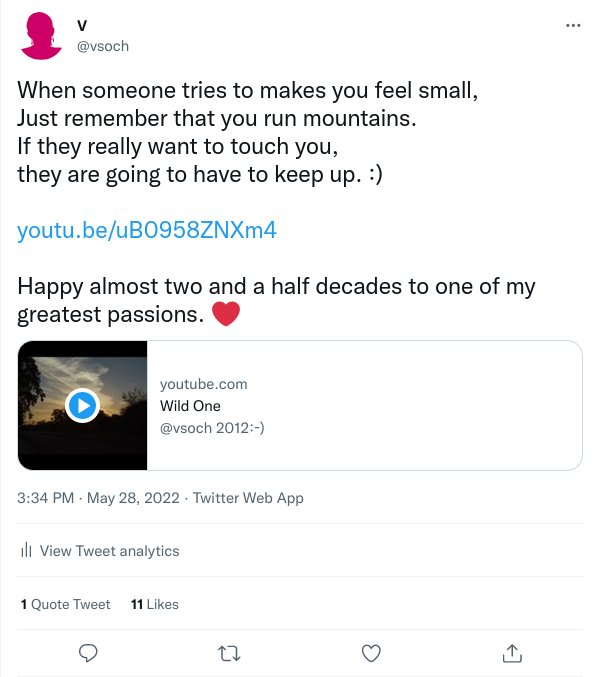
This exact post was in reference to running, but this is the point where I remembered my worth, and my strength. You can see the post and video here. I know I am an intensely passionate person. I know that I’ve survived things that even people decades older than me could not imagine. I know that I can run mountains, bike a thousand miles on my own with few resources, and single-handedly bring myself out of deep sadness after relentless adversity. I can identify a quality I don’t like about myself, and change. I can finish college, support myself, and enter and finish a prestigious graduate program while in medical crisis. I can do whatever it takes to survive. If some turkeys want to get me down? Or try to get in the way of my happiness and success? Well I run mountains. And if they really want to touch me, they are just going to have to keep up. :)
Ironically, I could actually flip this table and argue that an act to silence my deviant opinion is more marginalizing than having it. If we, in a community to support software engineeering in research, cannot present the simple idea (and champion it) that there should be change to a dated academic practice, what are we really here for? The idea of “publish or perish” is well established jargon in our community, and changing “perish” to “die” doesn’t really change that. And aren’t different opinions and ideas how things change and we have interesting discussion and grow? But that’s not how this played out. I am not being punished for my idea, I am being punished for my personality and intensity. These are intrinsic parts of me. They tend to have a hugely positive influence on the people and projects I touch, unless you either don’t know me well, or are threatened by what I’m capable of.
So how do I feel right now? I don’t feel like I can genuinely give the same devotion that I’ve been giving for years. My heart is just not there. How can I be a member of a community where I feel that I don’t have free speech? Where I know that someones don’t like me and are possibly out to get me? I’ve had conflict before - I’m not a squishy marshmallow that falls apart and must be protected - but this particular incident was a lot larger than possibly uncomfortable 1:1 interactions where maybe the other person was just having a bad day. I don’t feel safe. I look at the qualities of a community that I think are important - that people feel welcome, psychological safety, and are having fun, and have shared goals, and I don’t feel any of those things. My goals and direction have always felt against the grain, which is OK as long as the community is supporting of different views. This interaction taught me otherwise. Today I have decided that my energy and ideas are worth something, and that I am worth something. It is not my job to make myself smaller to make others that are uncomfortable with difference or change feel comfortable. I deserve better than that.
Hopes for the Future
Now let’s brush aside feelings and talk about policy. If we replayed these events again, what would any person need? I think most Code of Conduct reports need to make it clear that everyone is innocent by default until an investigation is done to conclude otherwise, and then there is an official meeting to come to said conclusion. If it has become public, this conclusion is shared. The committee shows their moral ground and makes it clear what was acceptable, what was not, and inspires some kind of growth around it. When committees make a mistake, they may even publicly apologize. We learn and grow from it. What happened here is that I was given vague information, and the only sense I had was that I was already guilty and needed to defend myself. I didn’t have a clue what to do, but I had to speak up to explain my expected absence. But it also didn’t matter because, beyond what I chose to say, no platform was given to my voice - it was all personal conversations with people in private chat, and even when a conversation finally happened, it was not really heard. This conversation needs to happen immediately, as a way to better understand what happened before anything else. It needs to happen quickly, and take into account the emotional stress that this kind of report puts someone under. My mental health was not considered, because I was the accused.
I’ve been doing some reading about Code of Conduct reporting and that seems to be the general consensus. It’s common to throw out a vague Code of Conduct, but not have a guide for how to enforce it, and to ensure that everyone is taken care of in the process. And sure, if I was making a targeted derogatory comment at a marginalized groups, or something sexually inappropriate, I’d probably have a sense that what I did was wrong. But speaking my own opinion about a practice and trying to get people excited for a different idea? That led to days of rumination about how that could possibly be on the same level as (the typical) truly malicious list of things that people really do.
Structure for reporting and people
We need a clear set of steps for making reports that asks the reader to compare their accusation with others that might come in. A good example is from GitHub.
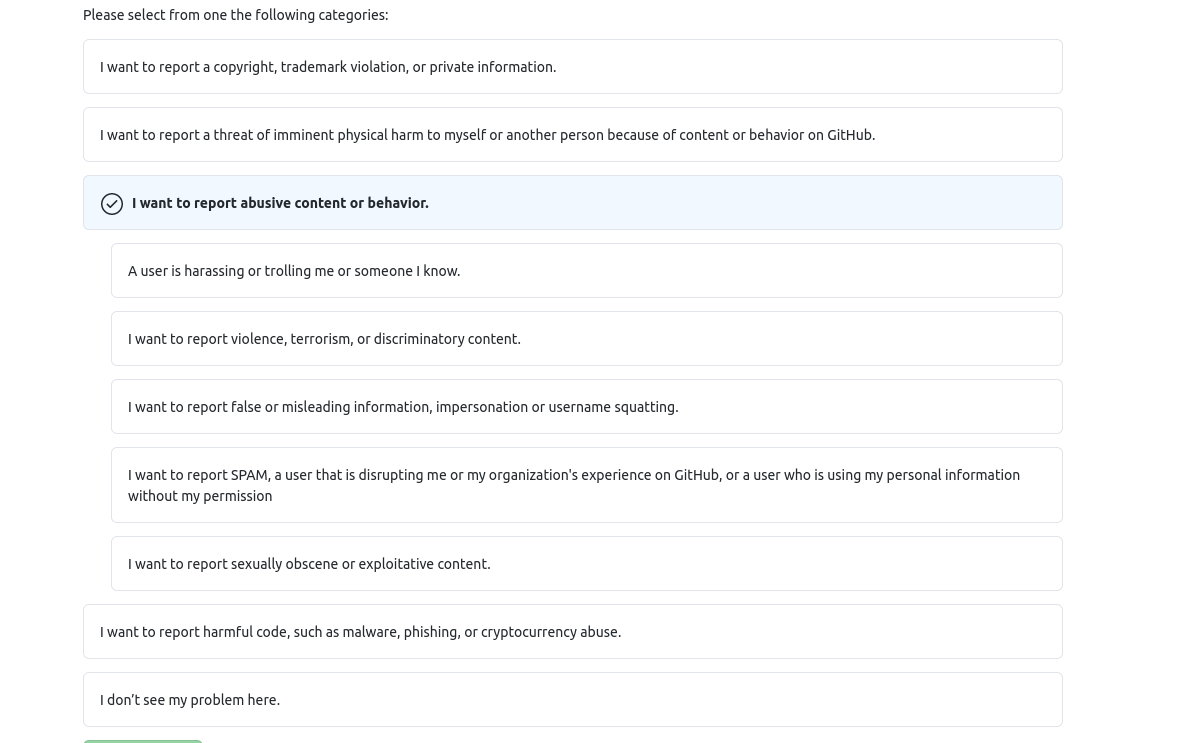
In the above, as you are considering your report, you say “Wow, I was slightly offput by someone’s personal statement that they don’t want to publish papers, is that really the same as these other things?” And then maybe you change your mind. This community should have a specific list, just like GitHub.
I had a small dangling bit of hope that people would be brave and speak up at the final community meeting about how this was handled, and the need to make things right, but I don’t think that happened. Maybe I am too idealistic and hopeful about having this kind of support. Moving forward, I hope that community members are more brave to stand up for one another, or maybe they shouldn’t have to be? Perhaps there can be a more formal structure for evaluating events beyond “the top secret leadership committee” that includes a diversity of perspectives. And for those in leadership, I hope there is moral backbone. There will be more reports, and a more firm line needs to be drawn, and with clear expectation. Leadership is not just enforcing political correctness and trying to justify a report by finding the right line in a document that it seems similar to. It’s not about trying to make everyone happy. For another extreme example, this kind of “make everyone happy” leadership is like leaving a window half open in a snow storm because someone asked you to (and you want to make them happy) versus saying “No, in this group we do not leave windows open in the snow storm because it will damage the car and everyone else will get cold.” And then follow up with “Let’s meet to chat about your needs for windows open in snow storms and see how they can be addressed.”
This community needs a plan to move forward to guarantee that this can never happen again, to anyone. And just because someone else might experience a different level of emotional distress from a Code of Conduct violation (I say this because someone in power pinged me early on and was like “oh a Code of Conduct violation is not a big deal it’s happened to me before!”) does not invalidate or discount how I felt. Everyone has different responses to these things, from brushing them off, to a complete shutdown, and all different kinds of responses need to be taken into account.
Plans for the Future
I’ve had to decide, on my own, how to move on from this. It feels like a loss, a death in my identity and loss of friends. The RSE Stories podcast will a bit dormant until further notice. It’s an enormous amount of hours and love that goes into audio editing and planning. I can’t do it if my heart isn’t there. That said, although I won’t be proactively scheduling interviews, if we’ve already talked about having you on the show, I’d still really like to talk to you. I am also still hoping that community members will want to step up and help, and craft a future direction for it. Do we even need it anymore? Should the focus be on something else? I don’t know. I do know that I’ve reached out to several people and gotten back encouraging words, but frankly, nobody has stepped up to the plate. Nobody has the time. I get it, and that’s okay. That’s why I’m stepping back from at least being proactive about it, and the door is open for any future that others might want. I will join and support that.
So what about me? My identity in the last few months has drifted away from being a research software engineer. I’ve tried to better identify with another title. I’ve always been different - working on core technologies like containers, developer tooling, and lots of automation, cloud, and standards, or even systems analysis. A lot of pushing for a diversity of RSEng is because I have felt so out of place myself with this traditional idea of a research software engineer - someone working on domain software, as a service or with a lab. In my current place of employment, I’m even starting to appreciate that my formal title isn’t that. In my truest of hearts, what sets me apart is my ability to focus, think through complex systems, and do enormous amounts of programming in a short amount of time. I can make an entire new project in a weekend. I can be presented with new concepts (languages or systems), learn them quickly, and then click it just makes sense, kind of like magic. So that said, I think I’m good with just being called a software engineer. Or if you are from Canada, I totally get a real engineer is a more earned title, so I’m good with software developer. It really doesn’t need to be for research, although I do deeply care about this community. In these last few weeks I’ve been doing Kubernetes development. I’m absolutely loving it.
Investment of Energy
I recognize that beyond my skills, my ideas and energy have value. So my plan now is to engage and bring them elsewhere, probably exploring other communities and finding a place that is more accepting of diverse opinions and people. To be clear, I’ll still casually interact with the larger RSEng community! I’ve been a tiny bit active on the UKRSE slack, and I’m so grateful to still have that. And maybe it’s OK that I step back, and the timing is just about right. The infrastructure I’ve built and people I’ve inspired has made a difference. The community is in a much better place than it was years ago, and my original advocacy has played a part in that. And if my strength is creating communities and creating energy and excitement around ideas, once they are created and better thriving? Maybe I’m not needed, and I can step away to give opportunities to others that haven’t had them yet, and I can find other places that need me more. I know I was a bit part of this early story, and for that I am proud. And hey, I’ll still (every once in a while) want to have some fun, and maybe do something like host a game or event. I still have good friends in the community, and I hope to not lost them. To summarize, some changes I’d hope to see that will protect future members of the community:
- Community members available in slack for facilitating discussion between members before reports are made.
- An automated reporting process (that akin to GitHub) makes people reflect on their choice to report.
- A clear setting of outline, timeline, and expectation for both sides.
- Transparency and empathy.
- Clear indication that both sides are innocent until proven guilty.
- A strong moral compass and ability to make decisions and clearly communicate them.
And I’ll close with the statement that I’ve been able to move on, and find some personal peace. I’ve said this before when talking about productivity and personal happiness, but I think there are times for saying “yes,” “no,” and “not anymore,” and I’m at a pivot point where change (and stepping away for a bit) is the right thing to do. I also want to say that I don’t feel any negative emotions for the individuals I’ve gotten close to over these years that are within this community. In the words of my friend Miranda, “I gotchu Bu!” and I really mean that. 😄️ I am always here for a quick chat, brainstorm of an idea, or helping with some piece of software. And ironically I wrote this on the day of the large conference announcing their community awards, and I was nominated!
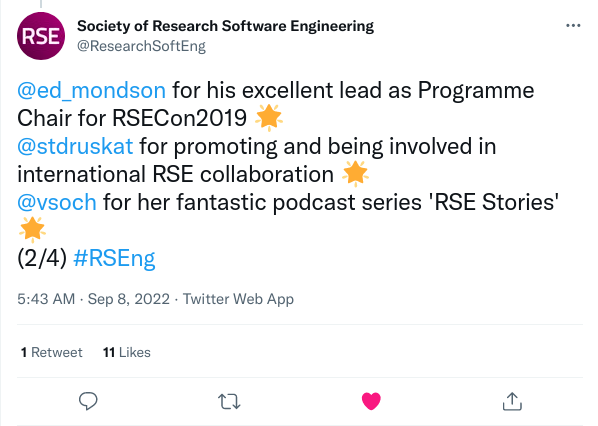
And more importantly, I am so proud of the other nominees whose lives I touched:

Congratulations to the winners, and to Peter, and I do feel that this is a nice point of closure for my overall contribution to the larger community. Someone has seen me, and I’m hugely grateful to that, and now the community clearly has some momentum and is going to move forward and make the world of research software a better place. I will enjoy watching, likely from a less active standpoint, and focus on my own passions. At the end of the day I’ve been able to remember this:
When someone tries to makes you feel small,
Just remember that you run mountains.
If they really want to touch you,
they are going to have to keep up. :)
And know that I’ll be OK.
Update: The Code of Conduct response group issued a formal apology via email to me late November, and although it’s over 6 months after the fact it really means a lot. Thank you. ❤️
Suggested Citation:
Sochat, Vanessa. "Code of Conduct." @vsoch (blog), 08 Sep 2022, https://vsoch.github.io/2022/code-of-conduct/ (accessed 03 Jan 26).